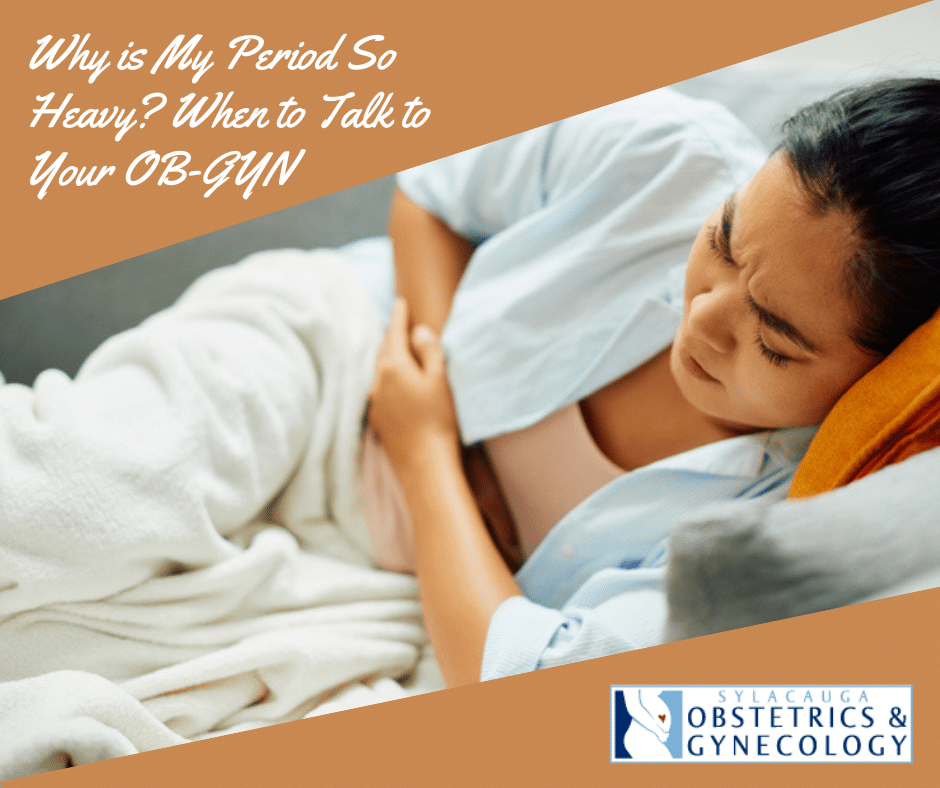
23 Oct Why is My Period So Heavy? When to Talk to Your OB-GYN
Though periods are something over 25% of the world’s population goes through every month, everyone’s experience with them is unique. And because we tend only to have our own experience to go by, it can be hard to know if you have abnormally heavy periods. We know that bleeding is expected roughly every 28 days—but how heavy is too heavy?
Talking about the details of your period with someone else—even your mother, sister, or best friend—can be uncomfortable, but you shouldn’t feel alone. About one-third of women will experience abnormal uterine bleeding (AUB) at some point in their lives. This common condition can be temporary or chronic, but understanding it can be a major factor in improving your quality of life.
AUB can affect your sex life, your mental health, your energy levels, and even the amount of iron in your blood, leaving you at risk of anemia. So let’s dive into what this condition is, what can cause it, and how your OB-GYN can help you take back control of your menstrual cycle.
Your Guide to Heavy Periods & Abnormal Uterine Bleeding
Periods aren’t the most comfortable experience in anyone’s life, but they shouldn’t keep you from living life to the fullest. If your menstrual cycle interferes with your ability to go to work, have a social life, or simply enjoy the things you love, call (256) 510-7165 to request an appointment at Sylacauga OB-GYN!
When is Menstrual Bleeding Considered Too Heavy?
In a normal menstrual cycle, you can expect to lose anywhere from 5 to 80 milliliters of blood. But what does that really mean? The American College of Obstetricians and Gynecologists has defined symptoms that fall outside the normal range to help you determine whether you may need to reach out to your OB-GYN.
If you ever have heavy bleeding and also feel short of breath, have chest pain, or feel dizzy or lightheaded, you should seek emergency treatment immediately.
Heavy Periods Defined
Heavy periods are also called menorrhagia. You may have menorrhagia if you experience one or more of these symptoms:
- Your bleeding lasts 7+ days
- You have to change your pad or tampon once (or more) an hour for several hours in a row
- You have to wear more than one pad at a time to avoid leaking
- You have to wake in the night to change your tampon or pad
- You pass quarter-size or larger blood clots with your menstrual flow
Abnormal Uterine Bleeding Defined
Any of the following symptoms may be considered abnormal uterine bleeding:
- Bleeding or spotting in between periods or after sex
- Heavy bleeding during your period (see above)
- Menstrual cycles lasting longer than 35 days or shorter than 21 days
- Menstrual cycles that vary by more than 7 to 9 days (irregular cycles)
- Missing your period for 3 to 6 months with negative pregnancy tests
- Bleeding after menopause (1 year without periods)
What Can Cause Abnormal Uterine Bleeding
Many things can cause heavy flow or AUB. Sudden and unusual episodes of heavy blood flow can happen to some (acute AUB), while for others the condition persists or returns for 6 months or longer (chronic AUB).
In some cases, these kinds of issues can be a sign of underlying health problems, like uterine fibroids, endometriosis, bleeding disorders, or hormone imbalances. Problems with ovulation are one of the most common causes. If your body does not ovulate (release an egg), the endometrium (lining of the uterus) may become too thick and lead to heavy bleeding.
Some forms of contraception, like copper IUDs, can also contribute to spotting or heavy flow, particularly in the first year while your body adjusts.
Treatment Options for Chronic Abnormal Uterine Bleeding
Treatment depends on properly diagnosing the root cause of your AUB. We may perform blood tests, pelvic exams, STD tests, or ultrasounds to start with. Based on your symptoms, medical history, and age, we may also move forward with endometrial biopsies or other imaging tests.
We typically begin with medications to try and manage your symptoms. Certain hormonal birth control pills can regulate your cycle. If you have a hormone imbalance, we may look to hormone therapy or tranexamic acid, a prescription medication that you take when your period starts. If you have another condition like endometriosis, we’ll focus on treating the underlying cause.
When these methods aren’t enough, we can also use Novasure ablation, a one-time procedure for women who are done having children and ready to find relief from heavy periods.
What is Novasure?
Novasure is a quick, five-minute procedure that removes the uterine lining responsible for heavy bleeding. It doesn’t require any incisions—instead, it works via radiofrequency energy. Your doctor will dilate your cervix and insert a small wand into your uterus, which delivers precisely measured RF energy for about 90 seconds.
This energy is entirely safe for your body but ablates, or destroys, the lining of the uterus permanently. This lining is where bleeding originates, so without it, you can expect light or even no periods. However, you must also be sure that you do not want children, as the uterine lining is essential for a fetus to grow.
We highly recommend a sterilization procedure before undergoing Novasure. Of course, we’ll always make sure that you know all your options well before a decision is made.
Talk to Your Doctor: Contact a Local OB-GYN Today
If heavy periods are running your life, you have options! Don’t be afraid to talk to your OB-GYN about any bleeding, cramping, or other menstrual symptoms that don’t feel right. We’re here to listen and to help you find the comfort and relief you deserve!
Learn More About Novasure Ablation in Sylacauga, AL & Beyond
At Sylacauga OB-GYN, we’re proud of our Small Town Doctors & Big City Care. We bring the latest proven treatments and technologies to women in the Coosa Valley Area so that they can receive convenient, quality care on their own terms. We’re accepting new patients now! Meet our OB-GYNs or call (256) 208-3813 to request your appointment today.


